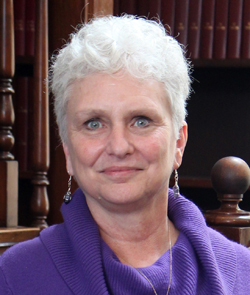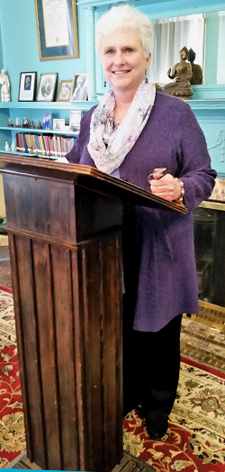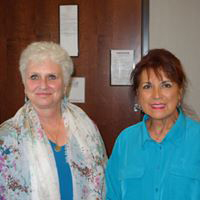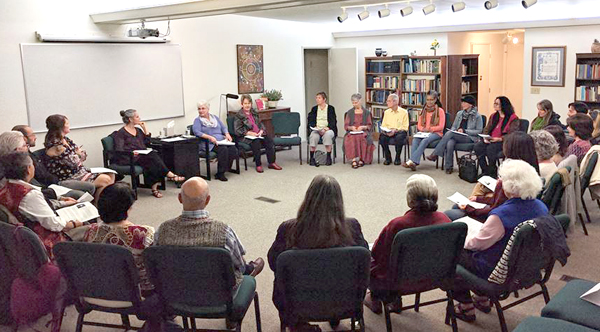Calm Mystery: A Selection from the Poems of Joy Mills
Printed in the Winter 2018 issue of Quest magazine.
Citation: "Calm Mystery: A Selection from the Poems of Joy Mills" Quest 106:1 pg 19-23
Joy Mills, late president of the Theosophical Society in America, had a gift for poetry that did not come to light until after her recent death. In the summer of 2017, Quest Books published her poems in a volume entitled For a Wayfarer. We are reprinting a selection below, along with a foreword to the book by her friend and neighbor Nelda Samarel (below). —Ed.
 Joy Mills is known throughout the Theosophical world as an extraordinary student of the Ageless Wisdom tradition. Having authored numerous books and countless journal articles, in 2010 she was presented with the prestigious Subba Row medal for outstanding contributions to Theosophical literature. Joy was an internationally sought-after teacher for almost the entirety of her seventy-five-year membership in the Theosophical Society. She held administrative positions as national president of two sections of the Society and as its international vice-president. In her later years especially, she was visited by countless Society members and nonmembers alike who appreciated her vast wisdom. She was not, however, known to anyone as a poet.
Joy Mills is known throughout the Theosophical world as an extraordinary student of the Ageless Wisdom tradition. Having authored numerous books and countless journal articles, in 2010 she was presented with the prestigious Subba Row medal for outstanding contributions to Theosophical literature. Joy was an internationally sought-after teacher for almost the entirety of her seventy-five-year membership in the Theosophical Society. She held administrative positions as national president of two sections of the Society and as its international vice-president. In her later years especially, she was visited by countless Society members and nonmembers alike who appreciated her vast wisdom. She was not, however, known to anyone as a poet.
Enjoying a twenty-six-year close friendship—the last fifteen years as next-door neighbors—Joy and I spent many hours together speaking about life’s more serious matters, including life, death, Theosophy, religion, and philosophy, as well as the many everyday topics friends would normally share: family, love, food, politics, and more. You name it and we covered it! Everything. Except poetry. We never spoke about, nor did Joy ever once mention, the topic of poetry.
During the months following Joy’s transition to the higher life on December 29, 2015, I had the honor of going through her belongings, including not only her personal effects, but also her lecture notes, files, and hundreds of books. Having no idea of her affinity for poetry, I was surprised to see the great number of poetry books, including works by well-known poets such as T.S. Eliot, Walt Whitman, Emily Dickinson, Ralph Waldo Emerson, and Edna St. Vincent Millay, along with some who were less well known. Although none of the books were annotated or underlined (as was Joy’s habit in her later years when reading anything of interest to her), it was obvious that the books were well read. One could almost feel the enjoyment that was derived in some past time from those well-worn pages.
In a closet, tucked away with old photos and college textbooks, I found an old book of handwritten poetry. One immediately could see that this was something very special. Originally a brown or rust-colored cloth cover and faded by seventy-five years of shelf life, it was meticulously covered with plastic, as would be expected of Joy. The cloth cover was embossed with a dove surrounded by an olive-branch circle. It was a book of blank pages, now brittle with the passage of time—of the type usually thought of for journals, diaries, or special notes—and had been given to Joy in 1941 as a Christmas gift from her dear college friend, Caroline Tess, later Caroline Ross. Caroline had lovingly inscribed the flyleaf:
Something to hold those things which you would choose to put together. With love, from Caroline
It is clear that Joy knew how she would use the book, as the next page, written in her own handwriting, was labeled “Poems” and inscribed:
These are the things I would put together for reverence, for Beauty, Love, Truth, and for Their Service.
Over the next several decades, Joy filled that cloth-covered journal with poems. In going through other documents, I learned that Joy studied poetry in college when I found several poems that had been written as class assignments. Some of these were revised, based on the professors’ comments, and dated. I also found several loose pages containing original poems among Joy’s files, as well as others tucked within the pages of the book. Joy had marked the date on a few of the poems. I attempted to identify the approximate date of each undated poem based on its content, the paper on which it was written or typed, and Joy’s handwriting, which had changed considerably over the years.
It is of particular interest that among Joy’s books was the classic by René Daumal, Mount Analogue, along with a biography of that author. According to Daumal, there are three great approaches to truth: philosophy, especially Plato’s dialectic; the “initiation” of the occult tradition, properly understood; and poetry as a means of achieving sacred knowledge. The complete works of Plato, along with several books of commentary, had a prominent place among Joy’s books, and she always had a strong interest in ritual and the occult. The only part of Daumal’s “truth trinity” that had not been evident in Joy’s literature collection was the poetry. That is no longer the case.
The collection covers a wide variety of subjects, reflecting the many-faceted Joy. These include poems about nature, animals, love, beauty, and more. Throughout the collection, Joy’s sensitivity and spiritual aspirations are evident. I hope you enjoy the poems as much as I have.
Calm Mystery
Here is the beach; out there the river flows
To touch some other shore where two may be
As lost in silent wonderment as we
Who stand apart and barter shallow prose
Between ourselves; at night a sea wind blows
And we have called the stir infinity
Or God or some more complex mystery,
And little knew the silent river froze.
Two solitary hearts may find their mating;
Two hands may reach together for the stars;
Two lips may utter vows to outwit fate.
Marriage may be the awful snare for baiting
All winged and carefree things behind steel bars:
But still the mind alone is celibate.
January 23, 1940
Christmas, 1944
Somewhere a bullet whines through the crystal air
And the sound of it is carried clear; the earth
Is one man listening for the echo’s birth
That speaks new pain. The eyes are vacant there
Who have looked too long on darkness and on night;
The heart is gone for hate, not love; and one
Is not enough to speak the thing that should be done
For mercy’s sake to usher in the Light.
Yet can we not believe that man may hear
A unity of sound pronounced clear
And all the earth be one in listening
To the silver bell of peace whose glistening
Is rapture to the heart, balm for the eyes
To seek anew that place the Young Child lies.
Trivia
They will recall the date of the war
And the names of the last of the kings;
How the world was sick with lust and hate—
But who will recall the little things?
Names of the prominent battles will live,
Names of the lands that were doomed,
Names of the guns and the planes and the year—
But who will recall how the lilacs bloomed?
The bloodless things will be on their lips—
The hour, the day, and the week.
The scholars will chat of the cycle of wars—
But who will recall the curve of your cheek?
Who will recall the little things?
The smell of the earth in northern springs,
The sound of rain, the beat of wings,
The little things—a yellow rose,
The tilting way a tulip grows?
Time
Time is our foster nurse when
sorrows come;
Though grave and taciturn,
now can so well
Coax back the heart from
grief’s delirium.
Restive we wander, seeking to
compel
Our hearts to peace by plucking
beauty’s string;
We climb with pilgrim eyes
the lovely hill,
Or roam the starlit roads
of evening,
Only to find earth’s music alien
and shrill.
At last, with quiet heart we
turn to see
Cool, soundless Time at work—
how from the dark
The obdurate seed becomes
the fragrant tree;
The mountain wearing still
the ocean’s mark;
How all the night hangs
on the far,
Patient geometry of each
small star.
***
Upon the branch of winter, the thorn that wounds
the promise of the rose: fragrance of beauty
To burst upon the air, when bird-song heralds spring.
So the year renews itself, turning from darkness
To the larger hope of light.
The old god Janus, looking back, reflects on beauty
Born another spring to blossom in the summer of our faith
And fruit itself in the autumn of our joy:
A miracle of remembrance that made the past year bright.
His other face, turned to the portal of the new,
Is held in light, a countenance of strength
That smiles upon the end of winter’s night
And looks with courage on the coming year.
My heart has yet another reason
To mark the new year’s birth:
The promise of the branch of winter reaching into bloom.
In April past was longing: a dream
Awakened and a dream to be.
A new April is the year’s turning and my heart’s rebirth:
The season of renewal for the Self of me—
The hunger of my winter ended—assurance
Of a vision’s blossoming.
New Year, 1962
***
There was an eagerness to go forward into the valley. I felt light and excellent, truly happy, carefree, at peace and at one with nature. The call startled me; for a moment I was anxious because I did not want to turn back. Then there was such a relief in seeing the door—it was a wooden door—like the door into the Gordon Castle at Huntley—massive wooden door—carved beautifully. I was eager to go through the door but suddenly apprehensive, yet pulled into it, for on the other side all was light and clear as though everything within me would stand revealed before a thousand eyes.
Last Testament
I will you all the sunny light
That floods this world for me.
I will you every dancing leaf
On every gracious tree . . .
To you, the murmured music of
A wood-lost stream, to you,
Dark tender shade, green lacy fern,
And robins’ eggs of blue.
Attar of rain-blest earth at dusk
And wild grapes’ gay festoon;
Wax lilies on an onyx pool
Beneath an opal moon;
Wee, frightened eyes to watch you pass;
And clean tang of the Pine;
Small quivers through the wind-swept grass.
All beauty that is mine.
And last I leave my place to you
For serving Man and God,
May your feet be falterless
Where mine have lightly trod.
Much be your gain of joy supreme
When I have passed you by;
High keep our little candle’s gleam—
And brighter, dear, than I.
Poems by Joy Mills and foreword by Nelda Samarel are reprinted by courtesy of Quest Books/Theosophical Publishing House.


 It is said that the only constant in life is change. Transition, change, can be both exciting and terrifying. It can also hold a variety of other feelings, including sadness and joy as well as guilt and anger. There is no end to the number of feelings an individual can experience during a time of transition.
It is said that the only constant in life is change. Transition, change, can be both exciting and terrifying. It can also hold a variety of other feelings, including sadness and joy as well as guilt and anger. There is no end to the number of feelings an individual can experience during a time of transition.

